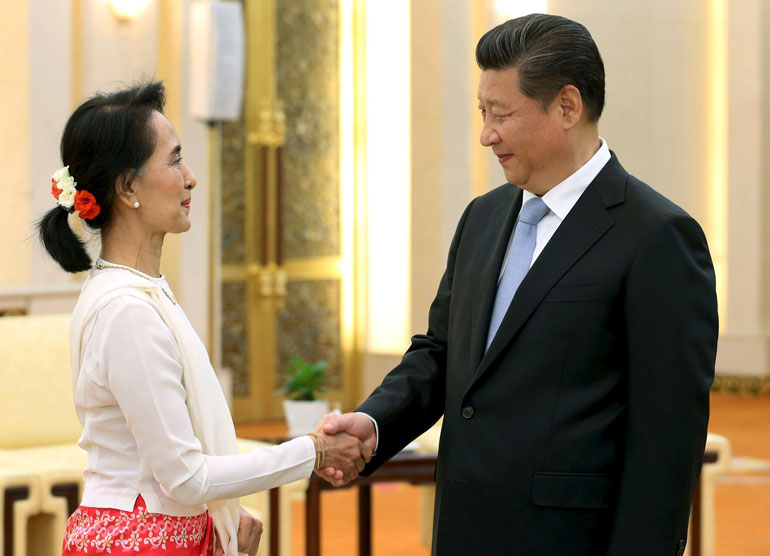Saturday Feb 21, 2026
Saturday Feb 21, 2026
Saturday, 13 June 2015 00:00 - - {{hitsCtrl.values.hits}}

China’s President Xi Jinping shakes hands with Myanmar pro-democracy leader Aung San Suu Kyi during their meeting at the Great Hall of the People in Beijing, China-REUTERS
BEIJING: Chinese President Xi Jinping on Thursday (11 June) met visiting Myanmar opposition leader Aung San Suu Kyi in Beijing, according to the official Xinhua News Agency.
The meeting took place at Beijing’s Great Hall of the People, Xinhua said. It did not immediately provide details on what was discussed.
Suu Kyi’s first trip to China is seen as Beijing’s attempt to build bridges with opposition figures in the region, and to soothe ties after recent tensions on the Chinese-Myanmar border. It has also been described as a historic shift in Beijing’s approach to one of its oldest allies in Southeast Asia.
“China is now facing competition in influence in Myanmar,” said Alice Ekman, research fellow at the French Institute of International Relations. “I would say that it has to maintain ties with both parties, as all the countries are reinforcing their ties in the country via political leaders.” Suu Kyi’s visit comes as once-close ties have been strained since Myanmar’s President Thein Sein suspended a multi-billion dollar China-backed dam project.
Relations have also been tested by fighting between Myanmar’s military and ethnic Chinese rebels that spilled over the border.
Beijing may look to Suu Kyi to help temper anti-Chinese sentiment in Myanmar, especially over China-funded infrastructure projects. Analysts also point to elections in Myanmar slated for November, at which Suu Kyi’s National League for Democracy is expected to do well.
“The democratic faction in Myanmar is likely to emerge victory, and enjoy an advantage in the legislative assembly,” said Associate Professor Du Jifeng from the Chinese Academy of Social Sciences at National Institute for International Strategy.
“Given such a scenario, China’s leadership feels that if China does not start to develop ties with opposition forces in Myanmar, especially those aligned with Aung San Suu Kyi, then the opportunity might have been lost.”
China has many geopolitical and business interests in Myanmar, and is diversifying its approach to safeguard those interests – especially with Myanmar reaching out to other countries following its democratic reforms and the lifting of most sanctions on it.
An ethnic Chinese rebel group that has been battling the Myanmar military on the border with China has announced a unilateral ceasefire, the group said on Thursday, after coming under pressure from Beijing to end four months of intense fighting.
The Myanmar National Democratic Alliance Army (MNDAA), which is led by ethnic Chinese commander Peng Jiasheng, said in a statement that the ceasefire began on Wednesday.
“The Chinese government’s strong calls for restoring peace in the China-Myanmar border region,” was one of the reasons for the decision, the statement said. The statement was authenticated by MNDAA spokesman Tun Myint Naing.
The MNDAA was formed from remnants of the Communist Party of Burma, a powerful China-backed guerrilla force that battled the Myanmar government until it splintered in 1989.
The group also said Myanmar’s coming election, scheduled for November, and the country’s democratisation process were reasons to try to bring an end to the fighting, but added that the group maintains its ‘right to protect ourselves’.
Ye Htut, Minister of Information and spokesman for the president’s office, said on Thursday that the government was aware of the announcement from the MNDAA but remained sceptical.
“We are monitoring their actual activity on the ground,” he said.
The MNDAA struck a truce with the government which lasted until 2009, when government troops took over their region in a conflict that pushed tens of thousands of refugees into China’s Yunnan province which lies next to Myanmar’s Kokang region.
Fighting intensified in early February, dealing a setback to Myanmar’s semi-civilian government which took power in 2011 after 49 years of military rule.
The Chinese army announced earlier this month it would stage drills military drills along a part of the border with Myanmar where shells have fallen during fighting between the Myanmar government and the rebels.
President Thein Sein has sought to reach a nationwide peace agreement with the country’s many armed ethnic groups but has been unsuccessful.
China has attempted to reach out to the country’s opposition leader Aung San Suu Kyi, whose National League for Democracy is expected to do well in November’s general election.
She departed for Beijing on Wednesday and is scheduled to meet Chinese President Xi Jinping and Premier Li Keqiang during her visit, which ends on 14 June.